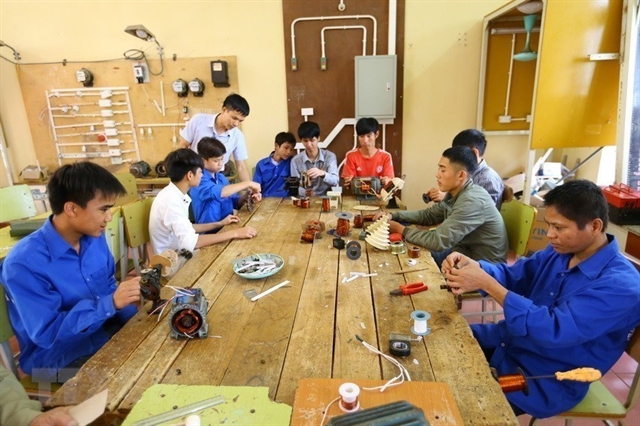 Society
Society


|
| People with disabilities attend a job training class at a vocational school in the central province of Thanh Hóa. — VNA/VNS Photo Anh Tuấn |
HÀ NỘI — There is a serious shortage of data on specific groups of Persons with Disabilities (PwDs) in Việt Nam, especially those who are most marginalised, including persons with hearing and learning difficulties.
As Việt Nam is set to conduct its second national survey on people with disabilities, it is important to collect data on the full spectrum of people with disabilities in Việt Nam, so as to develop appropriate actions and policies.
Representatives of the United Nations Development Programme (UNDP) Việt Nam, Việt Nam Federation on Disability and the General Statistics Office (GSO) held a consultation workshop regarding the issue on Thursday.
Speaking at the workshop, Patrick Haverman, Deputy Resident Representative of UNDP in Việt Nam, said that according to the latest UN analysis, out of the 158 sustainable development indicators of Việt Nam (VSDGs), only eight require data regarding those with disabilities.
Among these eight indicators, only two (the number of beneficiaries of monthly social allowance in the community, and number of people living and being cared for in social protection facilities or social housing) are collected by both the General Statistics Office and the National Council on Disability (NCD) through statistical surveys and reporting.
Data of half of the eight indicators to assess the level of disability inclusion in different areas of VSDG are not collected by NCD, such as the proportion of the population satisfied with their most recent experience of public services.
”It is difficult to find disability data; and when found, it is unclear which source should be cited due to the inconsistency of data reported by different Government agencies,” he said.
“It is important to make PwDs more visible in our national database and to have more indicators disaggregated by disabilities in VSDGs, which helps us better understand PWDs’ vulnerability and needs,” he said.
“UNDP is supporting the development of a set of output indicators for the National Survey on Persons with Disabilities in 2023 to be comprehensive and align with international standards,” Haverman said.
Đặng Văn Thanh, vice president of Việt Nam Federation on Disability, said there were about 6.2 million people with disabilities in Việt Nam including more than 700,000 children.
He said that the number of people with disabilities in Việt Nam released by different agencies was different from each other.
This crucial information was a foundation to design and develop activities and policies, for example, social welfare, education or healthcare, he said.
“The more exact the input information is, the better the outputs are,” he said.
Deputy head of the GSO Lê Trung Hiếu said that Việt Nam was preparing for the second national survey on people with disabilities next year.
The first National Survey on PwDs was done in 2016, using an internationally standardised toolkit for measuring disability. That survey was part of the National Statistical Survey Programme.
"Through that survey, for the first time, we had an overview of the disability rate in the general population nationwide, types and degrees of disability, as well as PWDs’ living conditions and the level of PWDs’ integration in a number of areas such as healthcare, social protection, education, employment, and a comparison of disability rates between socio-economic regions," said Hiếu.
Until now, there have been many reports by State agencies, organisations and for persons with disabilities, and disability experts still using data published in this survey.
After six years, the 2016 National Survey on Persons with Disabilities (VDS 2016) no longer accurately reflects the current situation of PWDs in Việt Nam, Hiếu said.
“The data needs to be updated and supplemented to better support the monitoring of disability-inclusive socio-economic development programmes and policies, and to better meet the law and policy-making requirements in line with international commitments, particularly the upcoming amendment of the Law on Persons with Disabilities, the monitoring of the implementation of disability-mainstreaming laws, policies, and the International Convention on the Rights of Persons with Disabilities (CRPD),” he said.
The GSO has proposed a set of 53 indicators to be disaggregated by disabilities, covering ten Sustainable Development Goals. The indicators can be used not only for the survey next year, but also serve the disability data disaggregation in other national statistical surveys, contributing evidence to the development of disability-inclusive socio-economic policies and programmes.
Nguyễn Đình Trung, a GSO official, said that in Việt Nam, according to the national population census 2009, people with disabilities made up 7.98 per cent of the country’s population aged from five.
According to VDS 2016, people with disabilities made up 7.06 per cent of the country’s population aged from two years old. It is estimated that now, there are about seven million people with disabilities in Việt Nam.
“Data about people with disabilities in Việt Nam still fails to meet increasing demands of data users, especially in policy making, monitoring and assessing the implementation of relevant laws as well as the implementations of international commitments that Việt Nam has made,” Trung said,
He said that GSO was developing plans to conduct the second national survey on people with disabilities in September and October next year, collecting responses of 75,000 households nationwide.
In addition, questionairs would also be offered to social sponsor centres which take care and offer services for people with disabilities. The survey will also collect information from commune/ward people’s committees, ministries, agencies, schools and grassroot healthcare centres.
Vũ Thị Kim Hoa, deputy director general of Child Affair Department under the Ministry of Labour, Invalid and Social Affairs, suggested that it was necessary to collect information about children with disabilities, which would help to better ensure child rights and address child-related issues. — VNS




